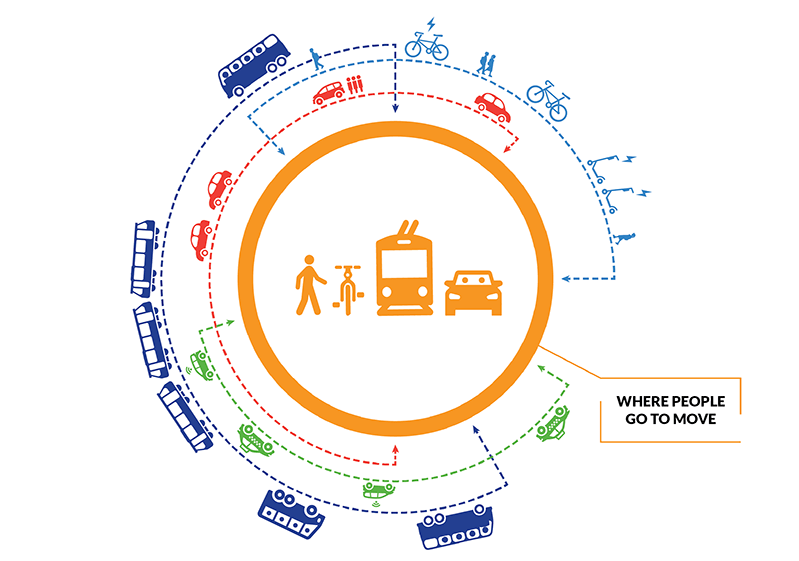Mobility Hubs are a key component of an alternative infrastructure where it is easier, more predictable, and more affordable to get around without a car. Over 9 million households in the United States do not own a car, and the proportion is much higher for Black and Hispanic households.
Mobility Hubs are a means for giving people access to more transportation options by creating nodes that connect existing and emerging transportation. Components of Mobility Hubs include bus shelters, pedestrian and bicycle access, signage, and placemaking, plus other transportation assets that could be concentrated at key points in the network to make transportation easier, more predictable, and more affordable while increasing its connection to communities and commerce.
SUMC is leading the charge to make a small but important policy change that would codify Multimodal Mobility Hubs as eligible for Federal funding under the Federal Transit Administration and Federal Highway Administration funding programs. We invite you to read our letter to the Senators and Congressman listed below and sign on by emailing [email protected]
Thank you.
May 17, 2021
The Honorable Sherrod Brown
Chair
The Honorable Patrick Toomey
Ranking Member
Committee on Banking, Housing and Urban Affairs
United States Senate
The Honorable Thomas Carper
Chair
The Honorable Shelley Moore Capito
Ranking Member
Committee on Environment and Public Works
United States Senate
The Honorable Peter De Fazio
Chair
The Honorable Sam Graves
Ranking Member
Committee on Transportation and Infrastructure
U.S. House of Representatives
RE: Include Mobility Hubs as an “Associated Transit Improvement”
in 49 USC 5302(1) and in 23 USC
Dear Chairs Brown, DeFazio, and Carper; Ranking Members Toomey, Graves, and Capito:
We are encouraged that the Biden/Harris Administration’s American Jobs Plan begins with “this is no time to build back to the way things were.”
We are encouraged because we know, as we hope you do, that the way things were is not good enough to meet the most urgent challenges that we face as a society and as a planet. The way things were led the way to the climate crisis. The way things were exacerbated (and continues to propagate) racial and economic injustice.
The coming infrastructure package is an unparalleled opportunity to decarbonize the transportation system, the single largest source of domestic greenhouse gas emissions. It is also an opportunity to open the door to the right investments that elevate local commerce and community, and to infrastructure that helps people make sustainable and equitable choices
To this end, we respectfully request the insertion of language in 49 USC and 23 USC to clearly authorize Multimodal Mobility Hubs (“Mobility Hubs”) as an expressly permitted activity:
- We ask you to designate Multimodal Mobility Hubs as an element eligible for federal transit funding by amending the relevant sections of transportation law. The change would be accomplished most readily by adding “multimodal mobility hubs” to the definition in 49 USC 5302(1) of associated transit improvements, or “projects that are designed to enhance public transportation service or use and that are physically or functionally related to transit facilities.”
Multimodal Mobility Hubs are a means for giving people access to more transportation options by creating the nodes that connect existing and emerging transportation. While many components of Multimodal Mobility Hubs are already eligible under this section—including bus shelters, pedestrian and bicycle access, signage, and placemaking—other transportation assets could be concentrated at key points in the network to make transportation easier, more predictable, more affordable, while making them more connected to community and commerce. Specifically, we suggest that you add the following language to Section 5302(1) as a new subparagraph:
- “(H) multimodal mobility hubs that provide dedicated locations for accessing multiple modes of shared transportation to connect transit with other transportation networks, mobility services and assets, local goods delivery, community amenities, charging facilities, and supporting technologies.”
- We ask that Multimodal Mobility Hubs also be added as eligible projects under 23 USC Sections 133 (Surface Transportation Block Grant) and 149 (Congestion Mitigation and Air Quality) to provide opportunities through highway funding for more cities to enhance mobility, community, and commerce. These sections also refer to Section 5302(1) of 49 USC.
Mobility Hubs are a key component of an alternative infrastructure that will provide more ways for people to get around without needing to use a car. Over 9 million households in the United States do not own a car, and the proportion is much higher for Black and Hispanic households. We believe the proposed changes will spur interest in their wider deployment.
Attached is a brief description of what Mobility Hubs are and why they matter. We list some of the opportunities Hubs can create for the community, and for commerce. We list examples that showcase existing and planned Hubs in San Diego, Portland, and Minneapolis; also examples from the UK and Europe. Mobility Hubs, along with other key legislative changes like the proposed Bikeshare Transit Act, are important elements in expanding clean and equitable transportation options for everybody.
The COVID-19 pandemic brought into stark relief the inequities in our transportation systems. Last year’s events also underscored how much racial injustice propagates through the infrastructure of our current systems of transportation.
And yet, the pandemic also showed that we can have a world of cleaner air, that we could make streets that are welcoming to people on bikes and people on foot. It gave impetus to making transportation more equitable. It showed a broad new constituency that mobility could work very differently if we gave people options and choices.
When Mobility Hubs bring together transit and other shared transportation, goods delivery, land use, community, and civic amenities, they represent a whole greater than the sum of the parts. They build back better.
Thank you for your consideration.
Respectfully submitted,

